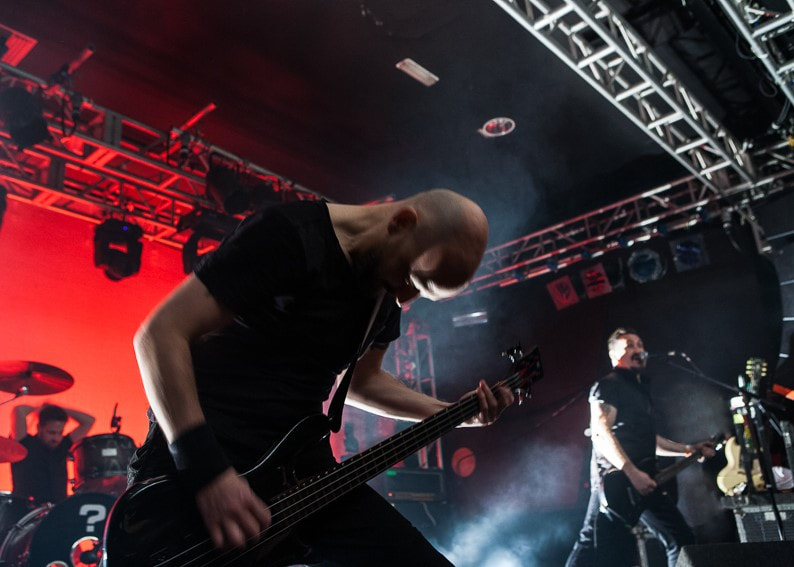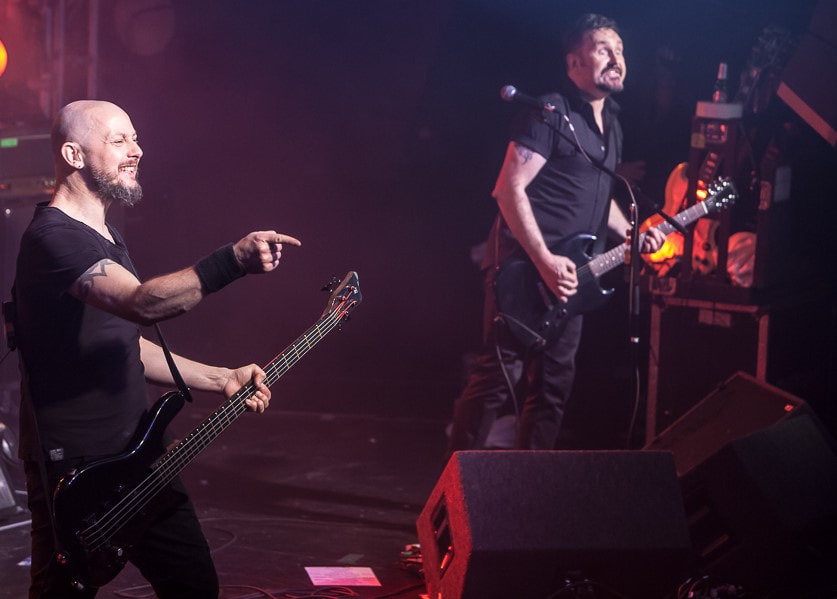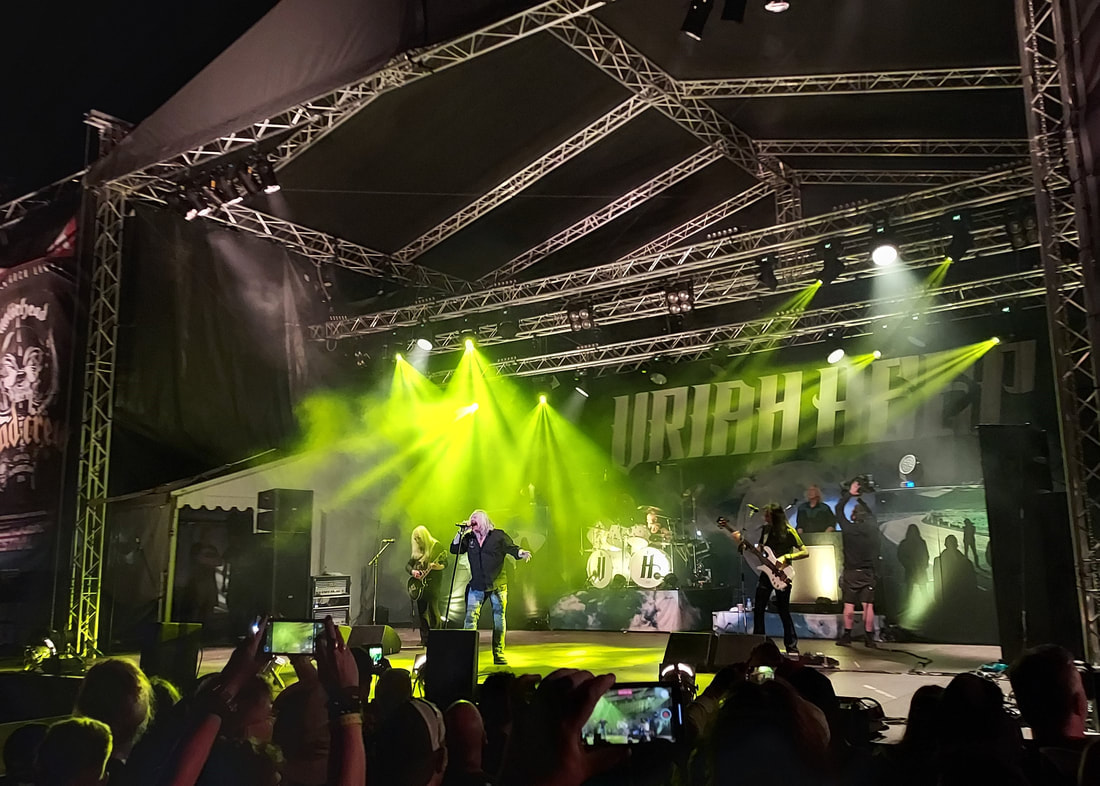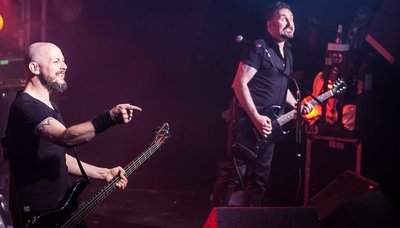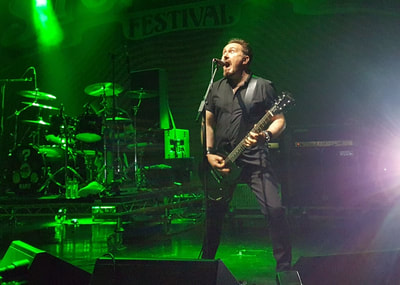|
Like a lot of bands, and indeed most of the world, this past year and a half has been a long layoff for Therapy? According to drummer Neil Cooper, in fact, it’s been a whopping 658 days since their last show. “It’s the longest break we’ve had since we formed the band”, says front man Andy Cairns as we sit down to chat ahead of their first post-pandemic gig, at Steelhouse Festival in Wales. Talking their now, somewhat ironically-named ‘So Much For the 30 Year Plan’ tour, progress on their new album, and Spinal Tap drummers, we sat down with Neil, Andy, and bassist Michael McKeegan for an extended catch up. Shameless; Eamon O’Neill.
Hi guys, welcome to Steelhouse Festival; how are you today?
Andy Cairns: Good, yeah. Neil Cooper: Very good. Michael McKeegan: Nice to be here, Nice to be out and about. The band recently released a biography [So Much For The 30 Year Plan: Therapy?-The Authorised Biography], and greatest hits album [‘Greatest Hits – The Abbey Road Sessions’], and you were preparing to hit the road to celebrate 30 years of Therapy? Then the pandemic hit; that’s quite an irony, isn’t it? Andy: Well, putting it into context, what happens with the band and whatever, compared to what happened worldwide with COVID, it’s nothing. But the greatest hits album, the re-recorded ones at Abbey Road went in the top forty, and the book went to number two in the rock biographies chart, so that hurt! That week, we were meant to go on tour, and a lot of the gigs had already sold out. I think the timing wasn’t great, but you know what, the book did at least come out, and at the end of the day, I’m just glad to be sitting here talking to you. It could have been a hell of a lot worse. The album and book were a great stopgap, but you certainly didn’t expect to be halted quite so dramatically, did you? Michael: No, but I think like as Andy said, in the grand scheme of things, what can you do? I think the fact that we had the album recorded, and the book came out in September, so maybe If it had been a brand new album… Neil: From our end, it could have been so much worse. Michael: Yeah, and it’s actually kind of a very Therapy? thing; to be doing the tour two years later! The band’s career has been pretty relentless, so this must be the longest break you’ve had? Andy: It’s the longest we’ve ever gone without playing gigs, ever, in our entire career, ever, ever, ever. It’s the longest break we’ve had since we formed the band. It’s even longer than in 2002 when Neil joined and we were looking for a label and the band was kind of in flux, and Martin McCarrick [cellist and guitarist] and us were not getting on that well. We still played a shit load of gigs, and we still rehearsed and did loads of demos. The book is a great read, and what’s startling is just how long this line-up of the band has been together; Neil, how long has it been? Neil: 2002, I joined. Andy: It’s the twentieth anniversary next year. There’ll be big celebrations! The book reveals how your joining came about, Neil; it was after bumping into the guys at a gig, wasn’t it? Neil: It was a Rival Schools gig. I drove down from Derby, and bumped into Andy at the bar; it was as simple as that. It was a chat at the bar, and then it obviously materialised. But speaking to Simon [Young, author] about the book, I was reflecting on that thinking things happen in life that are pure luck; I mean, I literally went to a gig, and then, twenty years later… With the history and impact of ‘Troublegum’, there is an iconic line-up, with Fyfe Ewing in the band; was that strange to step into?
Neil: Therapy? and The Beyond – the band I was in - toured together, so I’ve always had a massive amount of respect for the lads, so I was more excited about the opportunity to play with the band. Maybe I was a bit naïve in that sense, because I was really excited about it! It wasn’t really daunting, it was just; great tunes, the lads are great. Is that a bit simplistic? Michael: I’m just laughing because it’s kind of, when you’re in the middle of it, I never think [affects California accent]; “hey, we’re iconic. How would you ever replace me?” [cue huge belly laughs from the table]. Do you know what I mean? If you’re there doing it, you don’t really even think. As Andy says, we’re always busy and there’s always been a forward motion with Therapy?, so there’s never really been that much reflection, probably until we did the book, actually. To actually go through it without going; “what the fuck did happen?”; because you do stuff, you make decisions, and you move on very quickly. So I never really saw it as like that. When Fyfe left, definitely, we were ready for a change, and then when Graham [Hopkins, drums 1996 – 2001] left, me and Andy had a much better idea of the kind of player and person we wanted, and Neil had both of those aspects in spades. That was all we wanted for the band; we wanted an equal, someone who was on the same page, mindset-wise, as much as playing-wise as well, because we’ve been bands where you haven’t clicked on a personal level, and that is really destructive, I feel. I know there’s a rock and roll mythology of the conflicts - Jagger versus Richards and the magic they make - but I think those kind of relationships have a very limited creative lifespan. The most telling moment was when Fyfe didn’t show up for the after show party on the homecoming gig of the ‘Infernal Love’ tour, in December 1995. He was gone shortly after that. Michael: Do you know what? I think it was a good one to draw a line under. It was a good final ending. It didn’t end up in a crappy row about who ate the last cheese roll in Leipzig, on a wet Tuesday. It drew a line under it, and I think we both felt very at ease with moving on from there because we had a lot of ideas. It wasn’t working with Fyfe. We wanted to shake things up a bit and kind of reboot the whole thing, and that was good to do. Fyfe was in the band five years, and if you think about it, I know there was a hell of a lot crammed into those five years, but it wasn’t like… it’s not like Richie Blackmore left! Andy, you covered the end of that era in the song ‘Six Mile Water’ [1999], which contained the incredibly personal lyric; “I’m sorry, but I’m not ready for home”. Andy: At that point in time, people would occasionally ask about the original line-up. You know, all three of us were from Northern Ireland, and it meant a lot to people, but I still felt like I had a lot to say within the band Therapy?, with me and Michael. At the end of the day, as incredible a drummer as Fyfe was, he didn’t play any other instruments, and he didn’t write melodies, harmonies, or guitar parts. He drummed; that was his contribution, where as Michael has always contributed even guitar riffs, vocal lines, stuff like that. I felt we’d a lot more to say, and I was acknowledging the fact that we had a great time creatively together, and we were friends when we first started the band, and I acknowledged that, and I have great fond memories. I didn’t want to be bitter about it, so it was me almost having this conversation with myself and then deciding to move on. Fyfe is the only ex-member of the band that didn’t contribute to the book. Andy: He was approached. Simon called him, but he just didn’t answer it. But we are in touch with him because he has to sign off on things about publishing, and he has to sign off on various money things, so there’s no animosity there. It’s a bit like he’s gone his way and we’ve gone ours. But anything to do with the band, he always turns down, always, and that’s his complete choice, if that’s what he wants to do. A few times, people have said; “oh, there’s a re-release of ‘Troublegum’ coming up; do you want to contribute to that” – not us, people have got in touch with him, and he says; “no, not really”, so we’re not going to force the guy. The band now is us three, and it has been for years. Jumping from the past to the future, and how are things progressing for the next Therapy? album?
Andy: It’s very soon. Michael: We’re good. We’d actually done a bit of rehearsing before the lockdowns and stuff. I was in Northern Ireland so I couldn’t travel, so we couldn’t actually meet up to rehearse, but we’ve stuff we were doing before, and stuff we’ve been doing at home. We’ve got in a little process of being able to record stuff at home and demo it and get it to a certain spot, so when we were able to go back into the rehearsal room, we had some pretty solid stuff to work up. We’ve just been doing a bit of that, just tipping away at it, taking our time, getting it right. There’s obviously the gigs next year. So you want to give the ‘Greatest Hits’ tour a run before releasing a new album? Michael: Yeah, I think if you’ve bought a ticket that says ‘30th Anniversary Greatest Hits’; we’re not going to play ten new songs. That would be crazy. We might throw a song in, we might have something out by then - a single or something – but who knows? The plan is just to concentrate on the new stuff and get it ready. We’ve just done some rough demos, and then we’re getting to stage now where we’re getting a producer involved and will probably record it before the end of the year. The band is much more collaborative now than it ever was; going back to ‘Troublebum’, and Andy, you are credited as the sole songwriter on most songs. Andy: Yeah, I was. We’ve got ideas, and we all share it. With ‘Troublegum’, it was never like Fyfe came to me and said; “I’ve made these four tracks; what do you think?”, and I went; “hah! Take them away!”; he didn’t do any of that. I wrote all of the vocal lines and all of that. Michael had always come up with ideas, and then it just got to the point when I think whenever we became a three-piece again, it made a lot more sense because we’re very, very honest with each other; if any of them don’t like a guitar idea, they’ll be honest; “why not change the end of that riff”, and I’m open to that. We’re in a place now where we can say that to each other, whereas before… [Michael starts laughing] …You couldn’t say to Fyfe; “I don’t like that drum idea”, because he would huff; a steady diet of huffing. With Graham Hopkins it was the same, bless him, and Martin was. So you had to tiptoe around some people? Andy: We’ve all got out faults, but Graham and Martin, it was that kind of; someone plays a song, and then you’re at a bus stop at 2am in Shefield, and someone’s drunk and they go [launches tirade]; “I fucking never liked that song off ‘Semi-Detached – why did you make me play that?!” Whenever Neil joined, we didn’t want that happening ever again. I was surprised to learn in the book that ‘Nowhere’ was recorded in Randalstown. Andy: It was demoed in Randalstown, yeah. We demoed quiet a few of those songs there. We did ‘Knives’ there, we did ‘Femtex’, ‘Unbeliever’ was demoed over there as well. ‘Nowhere’, whenever we demoed it, it didn’t have the intro, and it was just pretty choppy / Ramones-ey, and I remember the studio engineer at the time, it was one of those classic things, when we wrote it, the engineer was a Therapy? fan, and he said [affects broad Antrim accent]; “it’s a bit poppy”, and then he had a few drinks in him later on and he goes; “Andy, hi, I’m not sure about that. It’s a wee bit poppy for Therapy?”! And it’s one of our biggest, most well-known songs across the world! Michael: There’s twelve songs we did pre-production on in Homestead, and there’s demos of them. That’s the famous scene where [producer] Chris Sheldon did the demo for ‘Die Laughing’, and Chris Sheldon plays drums on it. Andy: I think we mention that in the book where, the song was as old as the hills, and it was in our very early sets, ‘Die Laughing’, but we changed is slightly. Chris Sheldon loved it, it was one of his favourite songs of ours, and Chris Sheldon’s a drummer, but you couldn’t tell Fyfe what to do, and this is when I learned why producers get paid so much; he said; “okay Fyfe, can we try that again with a, maybe swing into it a bit more?”, and [Fyfe]; “no, no, no; this is what we’re doing, this is what you’re getting”, and Chris went to me; “who’s his favourite drummer at the minute?”, and I went; “John Stanier from Helmet” – “Okay, Fyfe, do me a favour, just try it one more time. I’m kind of hearing a bit of a John Stanier vibe; if we can maybe lean more into that?” And by process of attrition, he eventually got Fyfe to play the drumbeat he had in his head, in the style of John Stanier! Is that what you wanted for the track as well? Andy: No, we were quite happy with Fyfe was playing, but Chris was going; “no, it needs to be more like this”, and that’s what he brought to the party on some of the tunes. Michael: That was one of the things I think as well, going back to the whole producer thing where, ‘Troublegum’s the first album I think, when I heard it, it far exceeded what I heard in the rehearsal rooms. And that was because of, obviously the work we’d done on it, but Chris Sheldon’s involvement and a few other factors. Before, up until ‘Nurse’, they were always very well recorded versions of us live. I just felt ‘Troublegum’, the songs had really stepped up a massive gear from us in the room, to the demos, to that, and that was it. Those are the things you maybe don’t think about, and I suppose maybe at the time, if someone in the band’s not receptive to maybe go with it, that’s when you miss opportunities to make a song have a groovier beat, or a better riff, or a more memorable chorus.
Finally, speaking of producers, you worked with Chris again recently; will he be back for the new album? Andy: He did ‘Cleave’, yeah. Well, we think it might be a familiar face, but we won’t say any more than that! We have to just dot the is and cross the ts, but we think it’ll be a familiar face. Michael: Don’t jinx it! Like this interview? Like us on FaceBook and follow us on Twitter for regular updates & more of the same. Therapy?'s 'Greatest Hits - The Abbey Road Sessions' is out now, via Marshall Records. For all things Therapy? visit the band's official website. |
|
Therapy?
"It’s actually kind of a very Therapy? thing to be doing the tour two years later." - Michael McKeegan.
© 2016 - 2024 eonmusic.co.ukContact: [email protected]
|

